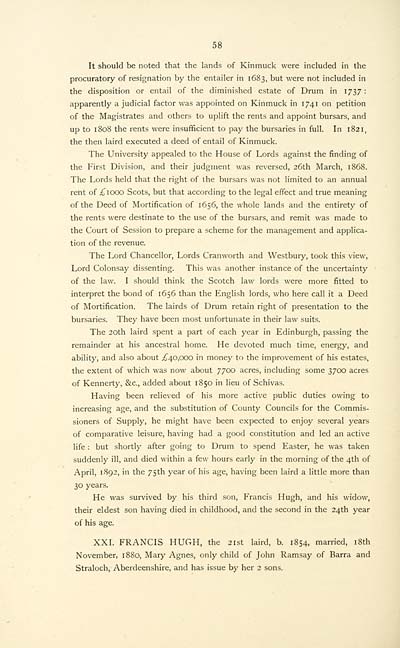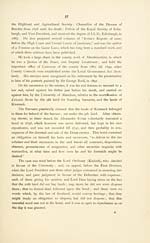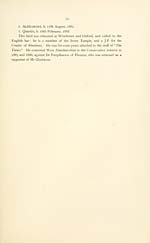Memorials of four old families
(340) Page 58
Download files
Complete book:
Individual page:
Thumbnail gallery: Grid view | List view

58
It should be noted that the lands of Kin muck were included in the
procuratory of resignation by the entailer in 1683, but were not included in
the disposition or entail of the diminished estate of Drum in 1737 :
apparently a judicial factor was appointed on Kinmuck in 1741 on petition
of the Magistrates and others to uplift the rents and appoint bursars, and
up to 1808 the rents were insufficient to pay the bursaries in full. In 1821,
the then laird executed a deed of entail of Kinmuck.
The University appealed to the House of Lords against the finding of
the First Division, and their judgment was reversed, 26th March, 1868.
The Lords held that the right of the bursars was not limited to an annual
rent of £1000 Scots, but that according to the legal effect and true meaning
of the Deed of Mortification of 1656, the whole lands and the entirety of
the rents were destinate to the use of the bursars, and remit was made to
the Court of Session to prepare a scheme for the management and applica-
tion of the revenue.
The Lord Chancellor, Lords Cranworth and Westbury, took this view,
Lord Colonsay dissenting. This was another instance of the uncertainty
of the law. I should think the Scotch law lords were more fitted to
interpret the bond of 1656 than the English lords, who here call it a Deed
of Mortification. The lairds of Drum retain right of presentation to the
bursaries. They have been most unfortunate in their law suits.
The 20th laird spent a part of each year in Edinburgh, passing the
remainder at his ancestral home. He devoted much time, energy, and
ability, and also about ^40,000 in money to the improvement of his estates,
the extent of which was now about 7700 acres, including some 3700 acres
of Kennerty, &c, added about 1850 in lieu of Schivas.
Having been relieved of his more active public duties owing to
increasing age, and the substitution of County Councils for the Commis-
sioners of Supply, he might have been expected to enjoy several years
of comparative leisure, having had a good constitution and led an active
life : but shortly after going to Drum to spend Easter, he was taken
suddenly ill, and died within a few hours early in the morning of the 4th of
April, 1892, in the 75th year of his age, having been laird a little more than
30 years.
He was survived by his third son, Francis Hugh, and his widow,
their eldest son having died in childhood, and the second in the 24th year
of his age.
XXI. FRANCIS HUGH, the 21st laird, b. 1854, married, 18th
November, 1880, Mary Agnes, only child of John Ramsay of Barra and
Straloch, Aberdeenshire, and has issue by her 2 sons.
It should be noted that the lands of Kin muck were included in the
procuratory of resignation by the entailer in 1683, but were not included in
the disposition or entail of the diminished estate of Drum in 1737 :
apparently a judicial factor was appointed on Kinmuck in 1741 on petition
of the Magistrates and others to uplift the rents and appoint bursars, and
up to 1808 the rents were insufficient to pay the bursaries in full. In 1821,
the then laird executed a deed of entail of Kinmuck.
The University appealed to the House of Lords against the finding of
the First Division, and their judgment was reversed, 26th March, 1868.
The Lords held that the right of the bursars was not limited to an annual
rent of £1000 Scots, but that according to the legal effect and true meaning
of the Deed of Mortification of 1656, the whole lands and the entirety of
the rents were destinate to the use of the bursars, and remit was made to
the Court of Session to prepare a scheme for the management and applica-
tion of the revenue.
The Lord Chancellor, Lords Cranworth and Westbury, took this view,
Lord Colonsay dissenting. This was another instance of the uncertainty
of the law. I should think the Scotch law lords were more fitted to
interpret the bond of 1656 than the English lords, who here call it a Deed
of Mortification. The lairds of Drum retain right of presentation to the
bursaries. They have been most unfortunate in their law suits.
The 20th laird spent a part of each year in Edinburgh, passing the
remainder at his ancestral home. He devoted much time, energy, and
ability, and also about ^40,000 in money to the improvement of his estates,
the extent of which was now about 7700 acres, including some 3700 acres
of Kennerty, &c, added about 1850 in lieu of Schivas.
Having been relieved of his more active public duties owing to
increasing age, and the substitution of County Councils for the Commis-
sioners of Supply, he might have been expected to enjoy several years
of comparative leisure, having had a good constitution and led an active
life : but shortly after going to Drum to spend Easter, he was taken
suddenly ill, and died within a few hours early in the morning of the 4th of
April, 1892, in the 75th year of his age, having been laird a little more than
30 years.
He was survived by his third son, Francis Hugh, and his widow,
their eldest son having died in childhood, and the second in the 24th year
of his age.
XXI. FRANCIS HUGH, the 21st laird, b. 1854, married, 18th
November, 1880, Mary Agnes, only child of John Ramsay of Barra and
Straloch, Aberdeenshire, and has issue by her 2 sons.
Set display mode to:
![]() Universal Viewer |
Universal Viewer | ![]() Mirador |
Large image | Transcription
Mirador |
Large image | Transcription
Images and transcriptions on this page, including medium image downloads, may be used under the Creative Commons Attribution 4.0 International Licence unless otherwise stated. ![]()
| Histories of Scottish families > Memorials of four old families > (340) Page 58 |
|---|
| Permanent URL | https://digital.nls.uk/95085010 |
|---|
| Description | A selection of almost 400 printed items relating to the history of Scottish families, mostly dating from the 19th and early 20th centuries. Includes memoirs, genealogies and clan histories, with a few produced by emigrant families. The earliest family history goes back to AD 916. |
|---|

